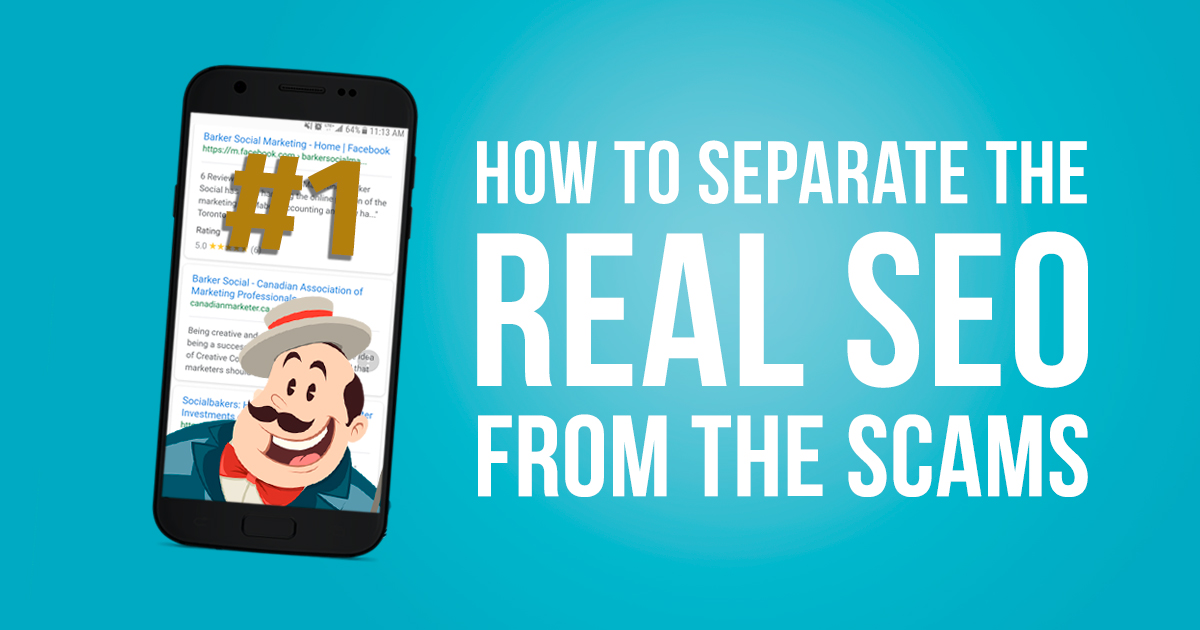
How to Separate the Real SEO from the Scams
Do you mistrust the idea of “SEO”?
SEO (Search Engine Optimization) is about maximizing your website’s performance to ensure that it ranks as highly as possible in a search engine like Google. However, phishing scams and spammy emails can make the entire SEO industry seem like a fraud.
…but did you know there are two kinds of SEO?
“White hat” SEO refers to ethical and legal ways of promoting your website and making sure that when people search for keywords associated with your business, your website pops up. But even within the white hat (good) realm of SEO, there are many agencies that take advantage of unsavvy business owners. This isn’t hard to do with SEO since all the work takes place behind-the-scenes. Many SEO firms charge an awful lot of money for their services and often don’t have much to show for it in the way of results. A good SEO company should be held accountable by providing detailed reporting about the work they’re doing to justify the price tag.
“Black hat” SEO refers to unethical ways of promoting a website that are sure to get you into trouble and could potentially even get your website banned. Let’s take a look at some of the most common black hat (bad) SEO techniques and phishing scams so you’ll be sure to avoid them.
Phone Calls About Your Google Ranking
Just say “no!” to callers who say they’re from Google. These phone calls can be relentless and they’re getting even worse. Google will never call you. When they want to get in touch with you, they’ll send you a snail mail letter or postcard.
If you stay on the line instead of hanging up on the calls, you can press a certain number to be removed from the list. Unfortunately, these scammers might still add you to a different list to receive another phone call that contains a variation of the original phone message, but eventually—if you keep selecting the removal button—they’ll leave you alone.
Unsolicited Emails
Almost always, an unsolicited email comes from a bot or a computer program and can include phishing scams like:
- “You need to register in order to appear in the search results.”
- “There is a fee and a time limit.”
- “Your site could get banned from Google since malware has been detected on your website. Pay us now to remove the malware.”
- “If you want your website to be found on mobile, hire us.”*
Even if it looks like Google has actually sent these emails, they most certainly have not. Don’t trust any claims that come from these types of emails, even if the “writer” (who is most likely a bot) says they’re “affiliated with Google.”
*And by the way, being found on mobile has nothing to do with SEO; it’s all about hiring a good marketing firm that specializes in responsive design.
Poor Link Building
Since its update in 2012, Google’s Penguin algorithm penalizes people who use paid services to get links to their site. As Google states on its policy page, “buying or selling links that pass PageRank are not allowed. This includes exchanging money for links, or posts that contain links; exchanging goods or services for links; or sending someone a ‘free’ product in exchange for them writing about it and including a link.”
Google also bans “excessive link exchanges or partner pages exclusively for the sake of cross-linking, large-scale article marketing or guest posting campaigns with keyword-rich anchor text links and using automated programs or services to create links to your site.”
Before Google made this their official policy, companies in low wage countries like India and China employed numerous link builders, promising to get businesses thousands of links every month for only a few hundred dollars. These companies still exist, so it’s important to ask questions and see previous work when a company is asking to build links for you.
Guaranteed Page Ranking
PageRank (PR) evaluates the quality and quantity of links to a website as a way to ascertain a relative score of that website’s importance and authority on a scale of 0 to 10. There are only a small number of websites with a 10 score, and those are websites like USA.gov, Twitter.com, and the Adobe Reader Download website. An average “good” website with a nice number of inbound links has a PageRank score of 5. Sites scoring 3 and 4 also have a fair number of inbound links, while a brand new website without any inbound links begins at PageRank 0.
But here’s the thing: Google no longer reveals the PageRank score for websites, and PageRank data is no longer accessible to developers via APIs either. PageRank is still an important ingredient to Google’s secret ranking algorithms, but no SEO expert will be able to tell you your PageRank, even if they wanted to.
You Get What You Pay For
Would you buy a brand new iPhone for $75 off the internet? Probably not. Why? Because it sounds too good to be true, so it probably is. The same thing goes for proper website management with proven SEO techniques. If you want quality results, you need to pay for that quality. If a firm is saying they’ll charge you only $50 a month for an array of services, the truth is likely one or more of the following things:
- They’re doing absolutely NOTHING after they receive payment.
- They have no clear strategy.
- They have no training or experience, which leads to poor results (if you even see results, which is unlikely).
- They connect you with low-quality links that could cause real trouble for your website in the future.
There are also firms that aren’t using black hat methods and charge a lot, but after the initial first month or two, they get lazy. They keep charging you for monthly SEO, but they just check in on your results from time to time, and stop putting in any real work. Because it’s all behind-the-scenes, you won’t really know what’s going on unless they offer real reporting.
Getting Real About SEO
Unfortunately, there will always be lazy SEO firms and people out there who use black hat methods as a way of making a quick buck. The truth is, there are no secret SEO tricks. SEO takes hard work, dedication, and patience. There are many ways to make your website visible, such as creating useful and engaging content rich in keywords, building quality links, and having a responsive website for mobile.
If you’d like to have an honest conversation about SEO, let’s talk. We’ll cut through all of the fluff and tell you how your website is actually doing and the reality of what would be involved to optimize it further.
To learn more about SEO check out the following articles:
- How To Hire The Right Type Of SEO Firm
- What Does SEO Cost?
- 6 Tips To Not Get Ripped Off When Buying SEO Services
- Top 5 White Hat SEO Techniques for Beginners



